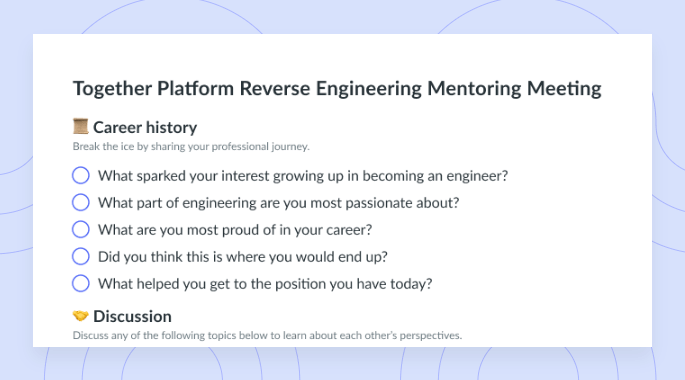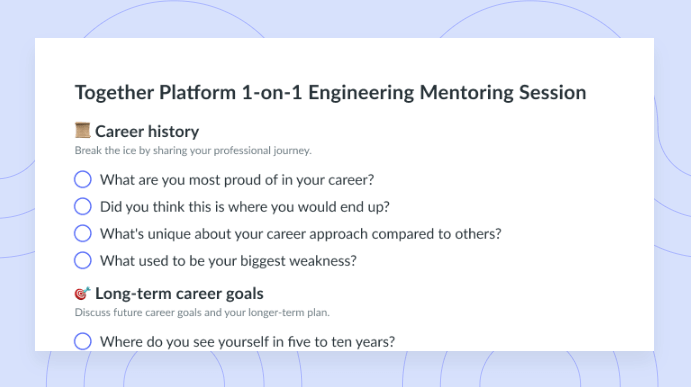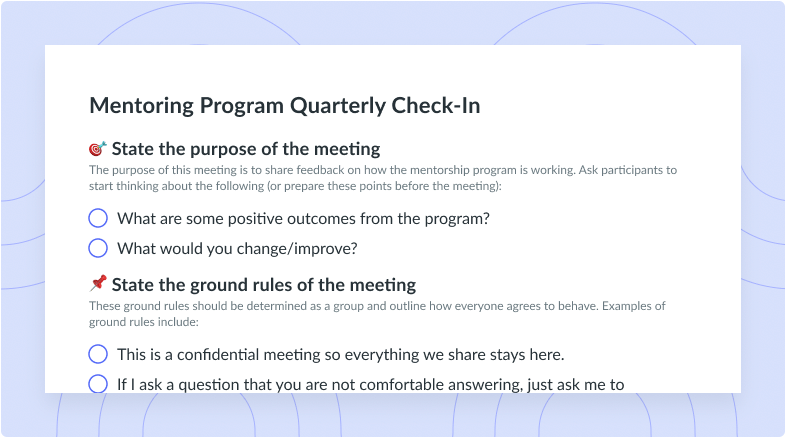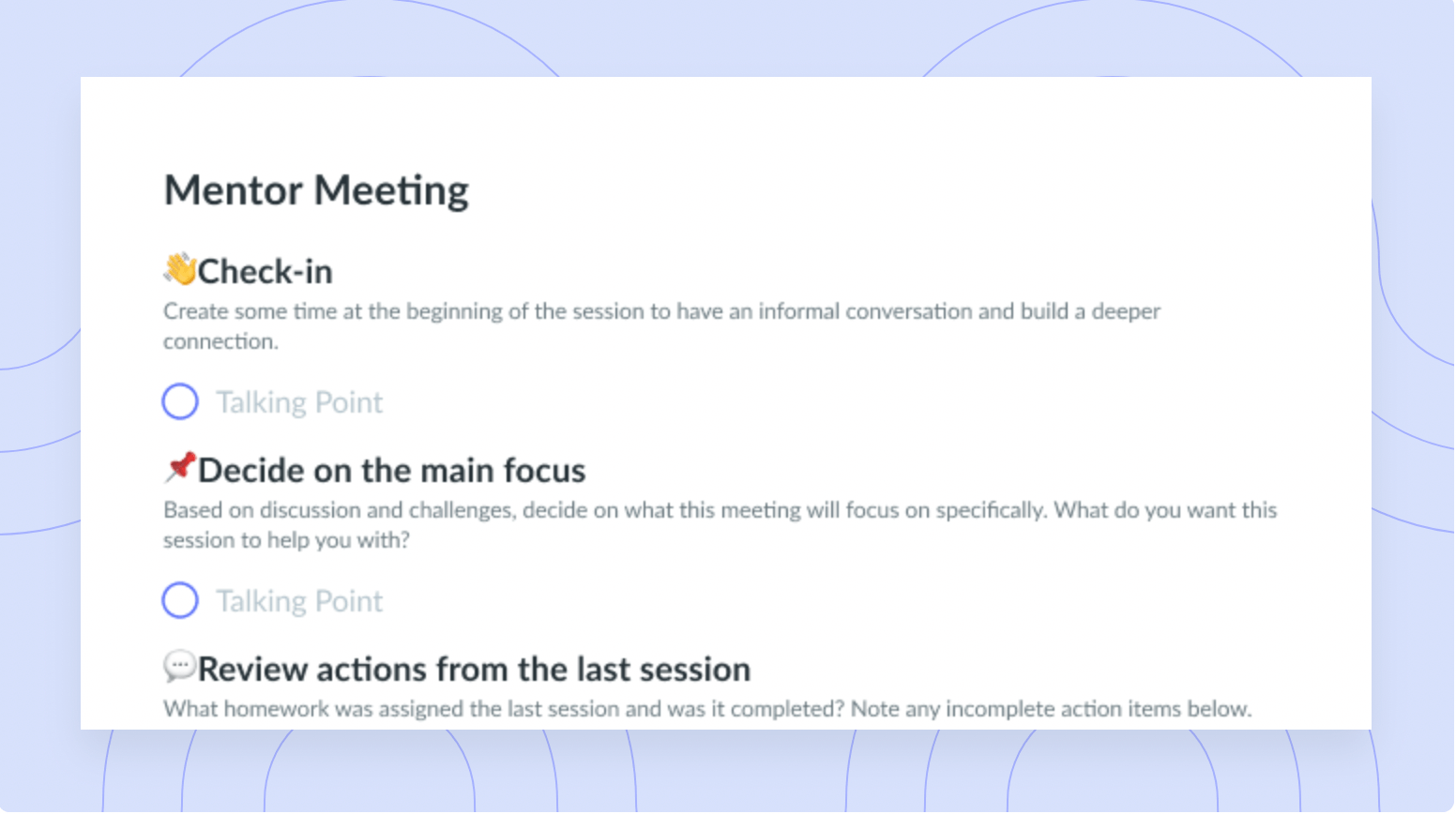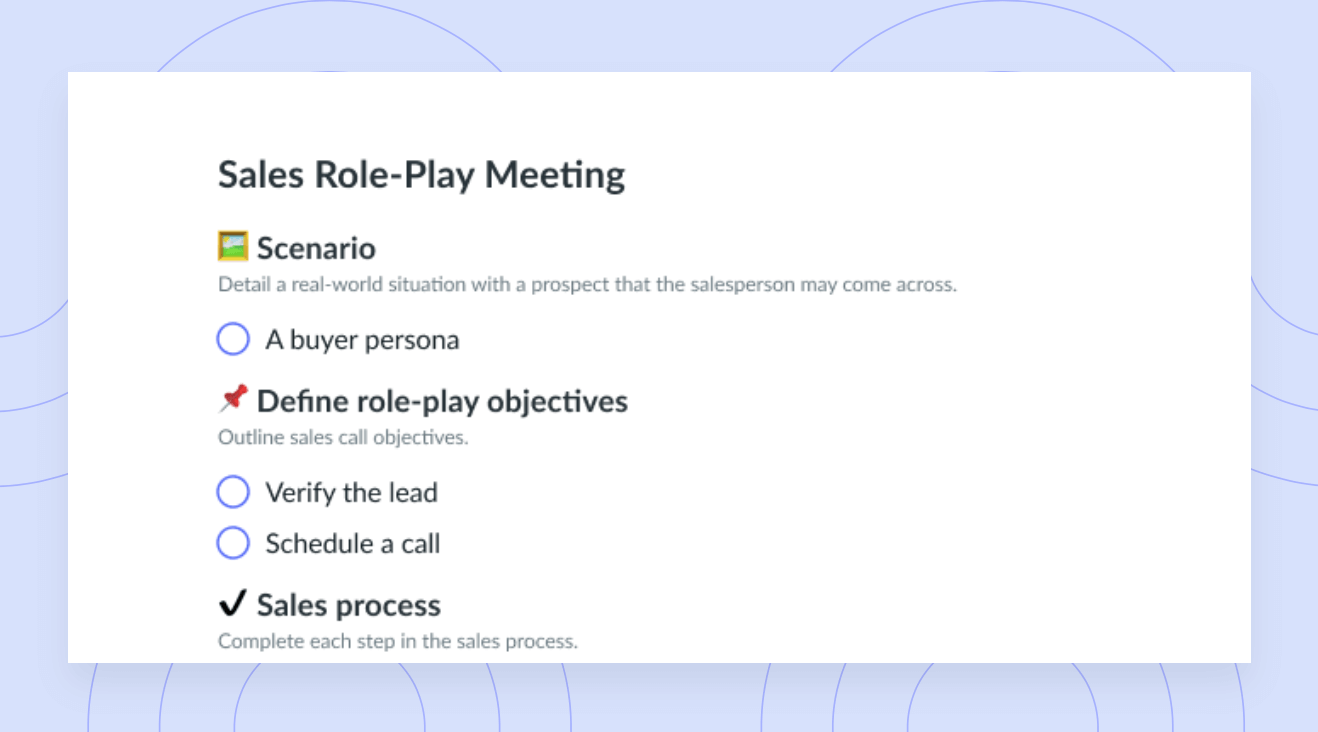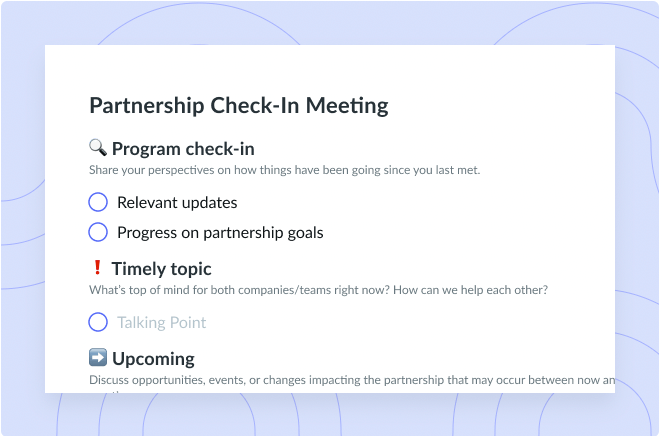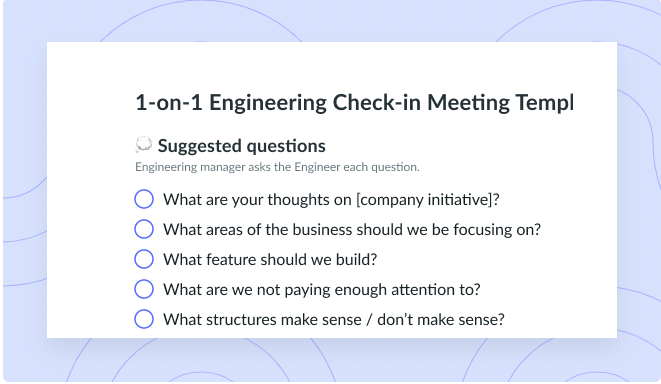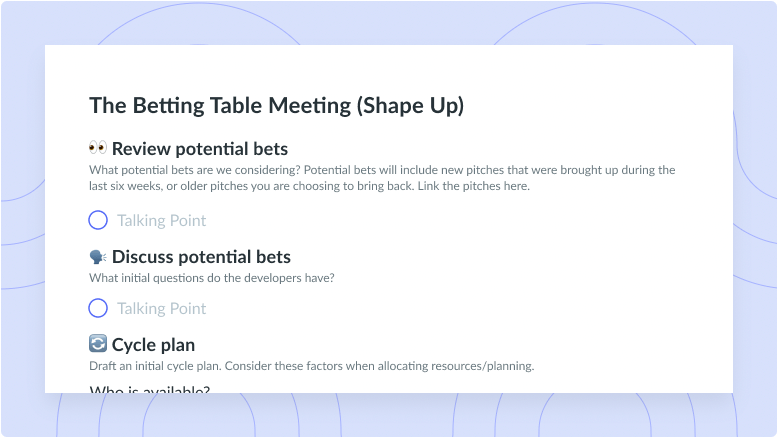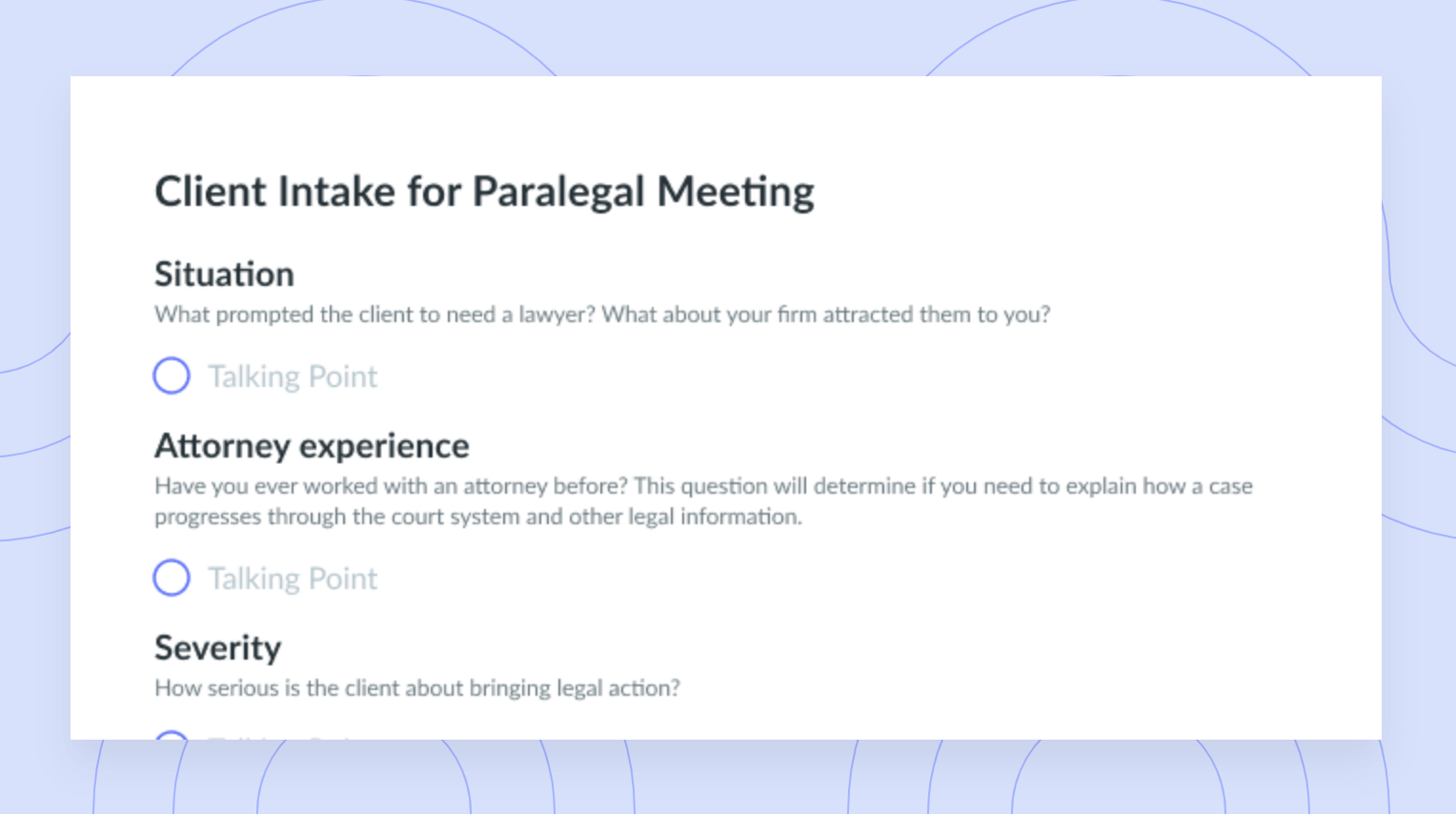Mentoring Software Engineers: 5 Best Practices [+ Free Template]
Learn how mentoring software engineers is rewarding and mutually beneficial for both the mentee and mentor.
Are you considering embarking on a mentorship journey? If you’ve been on the fence about mentoring a software engineer, we’re here to tell you why you should. Not only will you be cultivating a safe, inclusive space where your incoming team member can grow and thrive without conviction, but you will also be sharpening your own skill set and leveling up as a leader.
The benefits of mentorship in the workplace are undeniable. This article will dive into the perks of cultivating mentor-mentee relationships while highlighting the different types of mentorship and outlining best practices to keep in mind when mentoring a software engineer.
- How does mentoring software engineers benefit engineers?
- Types of mentoring
- 5 best practices for mentoring software engineers
- Free mentor meeting agenda template
How does mentoring software engineers benefit engineers?
- Fosters an inclusive workplace
- Helps you learn new skills
- Encourages collaboration
- Supports career development
- Increases talent retention
1Fosters an inclusive workplace
Facilitating mentor-mentee relationships is an excellent way to foster an inclusive workplace. New employees are guided by a friendly face that is always willing to offer advice and feedback, and mentors are able to gain a better understanding of their own skill sets while honing in on their leadership skills. Engineers are able to shape future teammates while teaching them about company values and shared goals.

Build a culture of effective meetings with your Engineering team
Level up your meeting habits to boost engagement and productivity with a collaborative meeting agenda. Try a tool like Fellow!
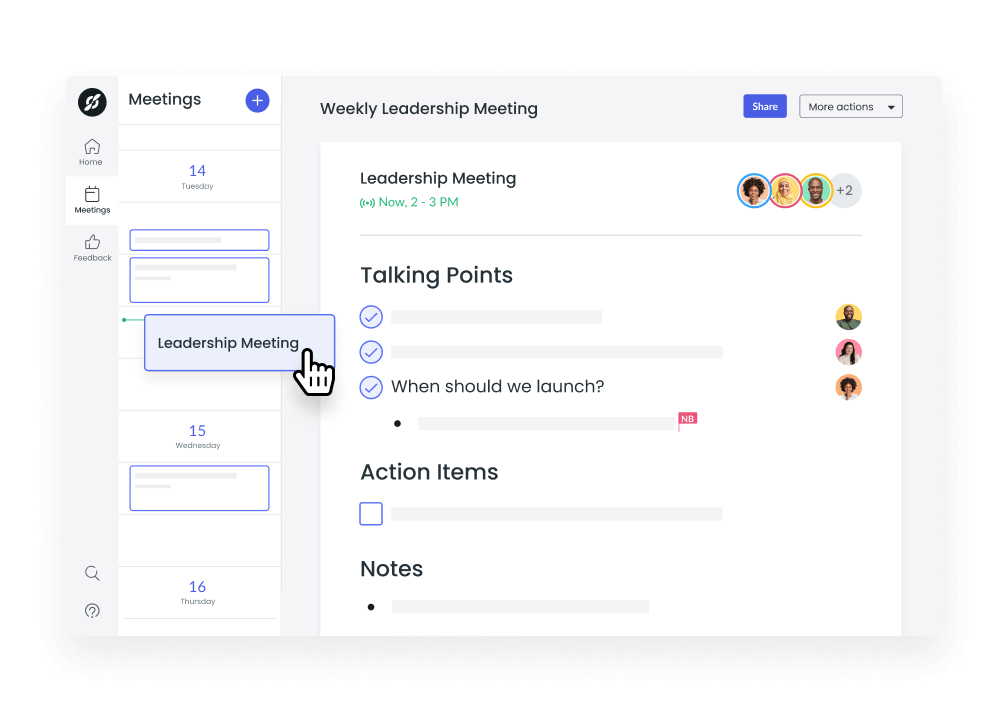
2Helps you learn new skills
Mentoring software engineers helps engineers gain a plethora of new skills. If these engineers haven’t had the opportunity to grow a team or manage direct reports, they will be able to hone in on their leadership skills by becoming a mentor. Mentorship is an excellent stepping stone to leadership, as said by David Hoang in episode 46 of the Supermanagers podcast:
“I think the best people leaders are the ones who have really focused on mentorship, really focusing on cross-functional alignment, they’ve already done it, & they’re starting to lead.”
Listen to the full episode here:
3Encourages collaboration
Facilitating mentor-mentee relationships in the workplace is an excellent way to encourage collaboration amongst engineers. Not only will the incoming engineer be trained and guided by an experienced employee who understands all best practices for navigating the organization, but you, as the mentor, will also have the opportunity to get to know the incoming engineer on a personal level. You can then leverage this relationship down the road to foster collaboration and work cohesively as a team.
4Supports career development
While the perceived notion may be that mentees are strictly the only beneficiaries in mentee-mentor relationships, the reality is that mentors also benefit from the relationship. Mentoring software engineers benefit engineers by providing them with additional opportunities to develop within their own careers. Providing mentorship helps engineers develop leadership skills like listening actively, being compassionate, and giving and receiving feedback, which are all crucial aspects of more senior engineering positions.
5Increases talent retention
It can be nearly impossible to retain top talent in today’s workforce. More and more employees are continuing to put their personal lives first, and organizations are being forced to get creative with perks and retention strategies. Implementing a mentorship program between new employees and experienced ones will give both parties a sense of purpose. The mentor will be able to hone in on their leadership skills, and the mentee will receive guidance and support as they navigate their new position at an unfamiliar organization—it’s a win-win! This type of relationship will foster trust and collaboration while strengthening working relationships, which will contribute to a more positive work environment.
Types of mentoring
1Formal
Unlike informal mentoring, a formal mentoring relationship will occur in a controlled or predefined environment like an organized program or workplace. Formal mentoring is structured, and both the mentor and the mentee will enter into the relationship with specific goals, benchmarks, and targets. Organizations often implement formal mentoring programs to pair new hires with experienced employees in an attempt to make the transition into a new role smooth and seamless.
2Informal
Informal mentoring can be defined as a relationship that has occurred naturally. This relationship may have started out as a friendship and later progressed into a mentor-mentee relationship through a natural occurrence. Informal mentoring occurs in a relationship between two people in which one gains insight, knowledge, wisdom, friendship, or support from the other. These relationships will develop outside of your workplace or organized programs, and either party may be responsible for initiating the mentor-mentee relationship.
3Onboarding
Onboarding mentoring occurs when a mentor is paired with a new employee during the incoming employee’s probationary period. The mentor will work alongside the mentee to offer advice and support during the onboarding process to make the transition as seamless as possible. This type of mentor-mentee relationship helps employees grow and thrive while allowing them to feel more connected to the organization.
5 best practices for mentoring software engineers
- Be an active listener
- Help your mentee solve their problems
- Leverage your network
- Support your mentee
- Adapt your approach to benefit each person
1Be an active listener
Actively listening is a crucial first step to diffusing a potential problem. Active listening involves listening intently while providing both verbal and non-verbal cues that demonstrate your understanding of what the speaker is saying. While you may be tempted to adopt a passive listening technique, it’s extremely important to be an active listener when mentoring software engineers.
Active listeners continue to make eye contact throughout the conversation, do not interrupt the speaker, use both verbal and non-verbal cues when communicating, stay focused and attentive, and ask relevant follow-up questions. By being an active listener, you’re helping to ensure your mentee feels heard, understood, and supported.
2Help your mentee solve their problems (but don’t give them the answers)
When acting as a mentor, it can be difficult to strike a balance between supporting software engineers as they navigate a problem, and simply giving them the answer. While you may have the experience necessary to give them the answer, it’s important to be mindful of the learning opportunity at hand. Empowering your mentee to solve their problems on their own will boost their confidence while ensuring they have the knowledge and tools necessary to solve a similar problem next time one comes up.
3Leverage your network
Leveraging your network may be a game changer for your mentee’s career. While you may have excellent advice or industry knowledge to share, leveraging your network may open your mentee up to a whole host of new opportunities. Do you have a connection at an engineering firm in which your mentee is interested? Put them in touch! Do you have an engineer who has more experience with managing engineers on the technical side? Put your mentee in touch so they continue to learn and grow.
4Support your mentee
The most critical aspect of any mentee-mentor relationship is continuous support. As a mentor, the most valuable thing you can do for your mentee is offer your support. Whether they’re vying for a new job, leveling up in their career, or simply looking to improve in relevant aspects of their career, your mentee needs you by their side to assist when necessary, so you should be there! The ways in which you can support your mentee are bountiful and include keeping communication open, offering continuous support, maintaining contact, being honest, and defining expectations.
5Adapt your approach to benefit each person
How you mentor one person may vary from how you mentor another. Every engineering manager has different goals and aspirations that may require a different approach. Also, every mentee will be unique and have different preferences and aspirations when it comes to their mentor-mentee relationship. Identifying your mentee’s learning style and preferred communication type will ensure you both have a positive experience.
Free mentor meeting agenda template
Whether you’re hosting your first mentor-mentee meeting or simply looking for a way to streamline your next one, this mentor meeting agenda template will ensure everything runs smoothly from start to finish.
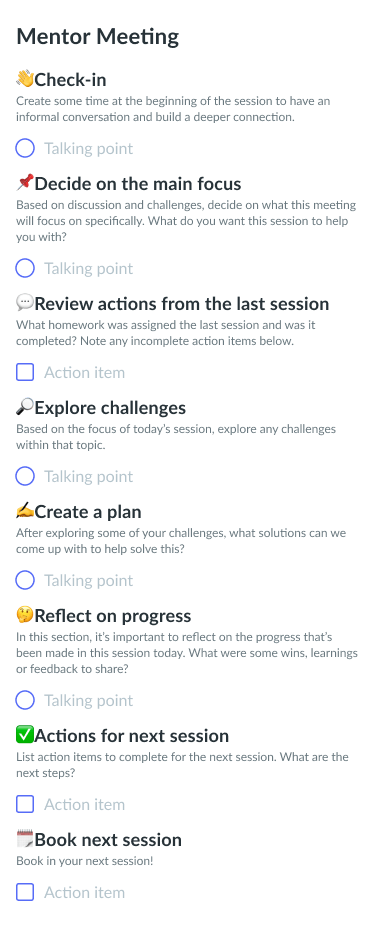
Parting advice
The perks of mentor-mentee relationships are invaluable for both parties. If you’ve been on the fence about mentoring software engineers, this is your sign to take the leap! By listening to and learning from mentees, you’ll be able to gain a better appreciation for the obstacles that more junior engineers may face in their day-to-day work while learning about the skills that are required to do their jobs. One of the many benefits for engineers embarking on a mentorship journey is having the opportunity to foster new relationships or rekindle old ones. You never know what opportunities your mentor-mentee relationships may lead to down the road!

![How to Find the Right Career Mentor [+ FREE Template]](https://fellow.app/wp-content/uploads/2022/05/how-to-find-a-career-mentor.jpg)
![How to Be a Great Engineer Mentor [+ Free Template]](https://fellow.app/wp-content/uploads/2022/07/Engineer-Mentors.jpg)






